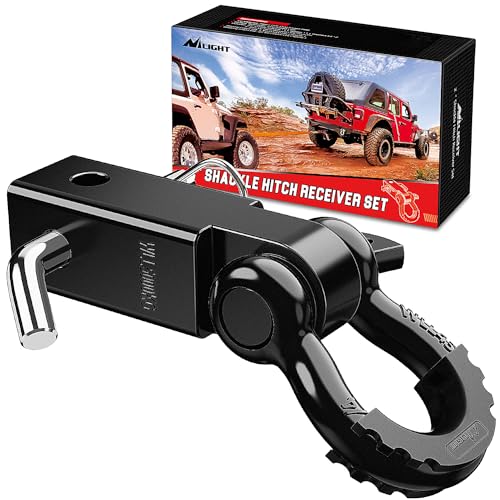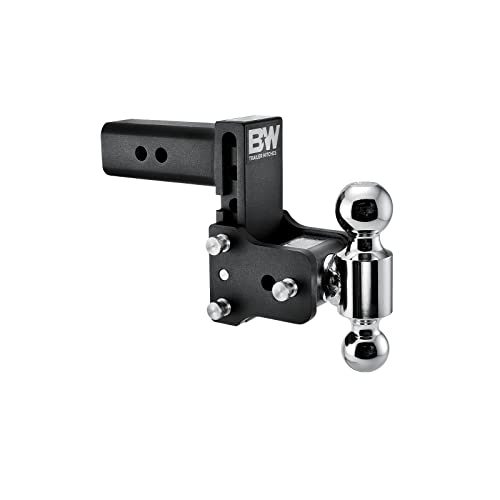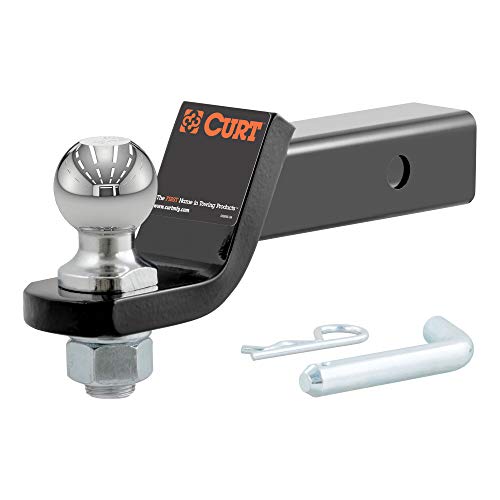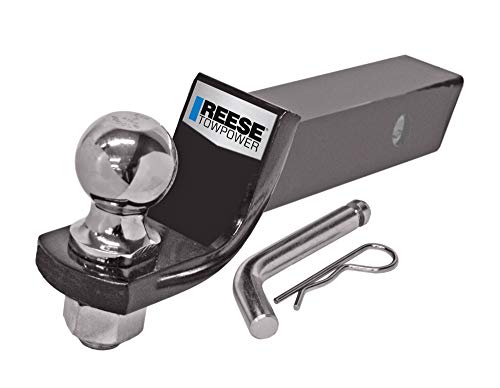When it comes to towing, having the right trailer hitch with safety chains, covers, and capacities is crucial. Understanding the different types of trailer hitches available can make a significant difference in your towing experience. From the traditional ball hitch to the versatile fifth-wheel hitch, each type has its unique features and benefits. By delving into the historical context of trailer hitches, we can appreciate how they have evolved over time to meet various towing needs. Whether you are hauling a camper, boat, or cargo trailer, knowing which type of hitch suits your vehicle and load can enhance safety and efficiency on the road.
Key Takeaways
-
Choose Wisely: Understand the different types of trailer hitches available to select the most suitable one for your towing needs.
-
Consider Hitch Classes: Familiarize yourself with hitch classes to determine the appropriate weight capacity for your trailer.
-
Compare Carefully: Evaluate the detailed comparison of hitch classes to make an informed decision based on your towing requirements.
-
Receiver Variety Matters: Explore various receiver types to ensure compatibility with your towing vehicle and trailer.
-
Special Needs, Special Hitches: Learn about specialty hitch types for unique towing situations that require specific features.
-
Heavy-Duty Demands: Discover heavy-duty towing solutions with a trailer hitch for hauling larger loads with safety and efficiency.
-
Proper Selection and Maintenance: Ensure you choose the right hitch by considering factors like weight capacity and compatibility, and follow installation tips and maintenance guidelines for optimal performance.
Understanding Hitch Types
Receiver Hitch
A receiver hitch boasts a substantial capacity of up to 20,000 lbs, making it ideal for various towing needs. It features a tube that allows for the attachment of accessories like bike racks or cargo carriers. Moreover, these hitches are compatible with most vehicles, offering versatility and ease of use.
5th Wheel Hitch
The 5th wheel hitch stands out with its impressive capacity of up to 30,000 lbs, catering to heavier loads for tow. This type of hitch couples to a specialized connection point known as a 5th wheel kingpin, providing enhanced stability during towing. Notably, 5th wheel hitches are exclusive to pickup trucks due to their design and functionality for towing.
Gooseneck Hitch
With a remarkable capacity of up to 38,000 lbs, the gooseneck hitch is designed for heavy-duty towing requirements. It connects to a gooseneck trailer through a ball mounted in the truck bed, ensuring secure and stable towing. Typically utilized with pickup trucks, gooseneck hitches offer superior strength and durability for demanding towing tasks.
Weight Distribution Hitch
A weight distribution hitch is capable of handling weights of up to 15,000 lbs effectively. This type of hitch plays a crucial role in leveling the vehicle and trailer when towing heavy loads. By distributing weight evenly across both the vehicle and trailer axles, it enhances safety and control while on the road. It requires a compatible hitch receiver for installation and operation.
Pintle Hitch
The pintle hitch stands out with an exceptional capacity of up to 60,000 lbs, making it suitable for heavy-duty applications. It couples to a lunette ring attached to the trailer's tongue, providing robust towing capabilities. Widely used in commercial and industrial settings, pintle hitches offer unmatched strength and reliability for hauling substantial loads.
Hitch Class Overview
Class 1 Hitches
Class 1 hitches have a specific receiver size of 1-1/4" x 1-1/4", with a weight rating of up to 2,000 lbs. GTW. They are suitable for lighter towing needs.
Class 2 Hitches
With a receiver size of 1-1/4" x 1-1/4", Class 2 hitches can handle weights of up to 3,500 lbs. GTW. These hitches are ideal for moderate towing requirements.
Class 3 Hitches
Class 3 hitches feature a receiver size of 2" x 2" and can support weights of up to 8,000 lbs. GTW. They are perfect for heavier towing loads.
Class 4 Hitches
Featuring a receiver size of 2" x 2", Class 4 hitches boast a weight rating of up to 10,000 lbs. GTW. These hitches excel in towing heavier trailers.
Class 5 Hitches
Class 5 hitches come with a receiver size of either 2" or 2-1/2" and can manage weights of up to 20,000 lbs. GTW. They are designed for towing the heaviest loads.
Detailed Hitch Class Comparison
Class 1 vs Class 2
Class 1 hitches typically have a smaller receiver size of 1.25 inches, while Class 2 hitches come with a larger 2-inch receiver. In terms of weight ratings, Class 1 hitches usually support up to 2000 pounds, whereas Class 2 hitches can handle up to 3500 pounds. When it comes to towing capacities, Class 1 hitches are ideal for light-duty applications like bike racks and small trailers, while Class 2 hitches are more suitable for medium-sized loads such as camper trailers.
Class 2 vs Class 3
Moving up the scale, Class 2 hitches feature a 2-inch receiver, similar to Class 3 hitches. However, the key difference lies in their weight ratings; while Class 2 hitches can tow up to 3500 pounds, Class 3 hitches offer a significantly higher capacity of 5000-8000 pounds. When considering towing capabilities, Class 2 hitches are commonly used for mid-sized trailers and boats, whereas Class 3 hitches are preferred for heavier loads like large campers or utility trailers.
Class 3 vs Class 4
Class 3 and Class 4 hitches both come with a 2-inch receiver size but differ in weight ratings. While a typical Class 3 hitch can handle loads ranging from 5000 to 8000 pounds, a Class 4 hitch boasts a higher weight capacity of up to around 10,000 pounds. The disparity in towing capacities between these classes makes them suited for distinct purposes; where Class 3 is suitable for heavy-duty trailers and RVs, Class 4 shines when towing larger recreational vehicles or equipment.
Class 4 vs Class 5
When comparing the receiver sizes of the trailer hitch between these two classes, both feature the same 2-inch receiver dimensions. However, the significant leap occurs in their weight ratings; while a standard Class 4 hitch supports loads of up to approximately 10,000 pounds, a robust **Class 5 hitch can handle an impressive weight capacity exceeding 20,000 pounds. This substantial increase in towing capacity from Class 4 to Class 5 makes the latter an excellent choice for hauling exceptionally heavy loads such as construction equipment or multiple vehicles.
Receiver Varieties Explored
Custom Hitch
A custom hitch is tailored to a specific vehicle make and model, ensuring a perfect fit. This personalized approach eliminates the need for modifications. The benefits of a custom hitch include enhanced towing capacity and improved weight distribution, crucial for heavy loads. In scenarios where standard hitches don't align with a vehicle's unique specifications, a custom hitch becomes necessary.
Rear Mount Hitch
Installing a rear mount hitch involves attaching it to the vehicle's frame, providing robust support for towing needs. The benefits of this type include easy access to the hitch and ample ground clearance. When towing, a rear mount hitch ensures stable handling and minimizes swaying. Various trailers such as utility trailers, boat trailers, and camper trailers are compatible with rear mount hitches.
Front Hitch
A front hitch is mounted on the front of a vehicle, offering versatility in towing applications. The primary advantages include increased maneuverability when parking or navigating tight spaces. In off-road situations or when launching boats, a front hitch proves beneficial due to its accessibility and ease of use.
Multi-Fit Hitch
A multi-fit hitch stands out for its adaptability across different vehicle models without requiring specific customization. This versatile option can be adjusted to fit various vehicles with ease. The installation process is straightforward, making it ideal for individuals seeking convenience and flexibility in their towing setup.
Specialty Hitch Types
Bumper Hitch
A bumper hitch attaches directly to a vehicle's bumper, providing a simple towing solution. It is ideal for light loads and small trailers. Bumper hitches are commonly found on trucks and SUVs, offering convenience for occasional towing needs. The weight limitations of a bumper hitch typically range from 2,000 to 5,000 pounds, making them suitable for hauling smaller items such as bikes or small utility trailers. However, it is essential to note that bumper hitches may not be suitable for heavier loads due to their design limitations.
When using a bumper hitch, it is crucial to understand the weight restrictions to prevent damage to both the vehicle and the trailer. Exceeding the recommended weight limit can strain the vehicle's suspension and brakes, leading to safety hazards on the road. Therefore, it is advisable to check the manufacturer's guidelines for the specific weight capacity of your bumper hitch before towing any trailer.
Types of trailers that are compatible with a bumper hitch include lightweight utility trailers, small camping trailers, and bike racks. These trailers are designed to stay within the weight limits of a bumper hitch, ensuring safe and efficient towing experiences. For individuals looking to transport smaller items or engage in recreational activities like camping or biking, a bumper hitch provides a practical and straightforward towing solution.
RV Hitch
An RV hitch, also known as a fifth-wheel hitch or gooseneck hitch, is specifically designed for towing larger recreational vehicles (RVs). These hitches offer enhanced stability and control when towing heavy loads over long distances. RV hitches feature a unique coupling mechanism that connects to the RV's kingpin or gooseneck ball, providing a secure attachment point.
The benefits of an RV hitch include improved maneuverability, reduced sway during travel, and increased towing capacity compared to conventional hitches. RV hitches allow for tighter turns when navigating challenging terrains or parking spaces, enhancing overall driving flexibility.
Towing an RV requires careful consideration of several factors such as the vehicle's towing capacity, trailer weight distribution, and braking systems. It is essential to ensure that your vehicle meets the necessary requirements for safely towing an RV with an RV hitch. Prioritize safety by adhering to speed limits and practicing proper loading techniques when using an RV hitch.
RV hitches are compatible with various types of trailers such as fifth-wheel trailers and gooseneck trailers. These trailers are specifically designed to work in conjunction with RV hitches, providing stability and control during transportation.
Heavy-Duty Towing Solutions
5th Wheel Applications
5th wheel hitches are commonly used for heavy-duty towing, especially with large recreational vehicles and industrial trailers. Their unique design allows for increased stability and weight distribution, making them ideal for long-distance travel and hauling heavy loads. These hitches are favored by RV enthusiasts and commercial drivers alike.
-
Advantages of Using a 5th Wheel Hitch:
-
Enhanced maneuverability, especially when navigating tight spaces.
-
Superior towing capacity compared to conventional ball hitches.
-
Reduced swaying and improved control while on the road.
-
-
Types of Trailers Commonly Used with 5th Wheel Hitches:
-
Fifth-wheel trailers, popular among campers and travelers.
-
Horse trailers designed for equestrian transportation.
-
Flatbed trailers utilized in construction and agriculture.
-
Gooseneck Uses
Gooseneck hitches offer versatile towing solutions, commonly found in agricultural, construction, and commercial settings. Their flexibility allows for sharp turns without sacrificing stability, making them indispensable for various industries requiring heavy hauling capabilities.
-
Benefits of Using a Gooseneck Hitch:
-
Greater weight-carrying capacity than traditional ball hitches.
-
Improved weight distribution leading to enhanced handling and safety.
-
Ability to tow larger trailers with ease due to their robust design.
-
-
Industries or Activities Requiring Gooseneck Hitches:
-
Agriculture sector for transporting farm equipment like tractors.
-
Construction industry for hauling materials such as lumber and machinery.
-
Livestock transportation due to the stability provided during transit.
-
Weight Distribution Benefits
Weight distribution hitches play a crucial role in ensuring safe towing practices. They help evenly distribute the trailer's weight across the vehicle, reducing strain on the rear axle and improving overall driving performance. These hitches are essential for maintaining control and stability while towing heavy loads.
-
Importance and Benefits of Weight Distribution Hitches:
-
Minimize trailer sway caused by uneven weight distribution.
-
Enhance braking efficiency by keeping both vehicle and trailer aligned.
-
-
Impact of Weight Distribution Hitches on Vehicle Performance:
-
Improved steering response and reduced wear on tires.
-
Pintle Strengths
Pintle hitches are renowned for their durability and strength, making them ideal for heavy-duty towing applications. Their simple yet robust construction ensures reliable performance under extreme conditions, making them a preferred choice in military, agriculture, and construction sectors.
-
Strengths and Advantages of Pintle Hitches:
-
Ability to handle high towing capacities without compromising safety.
-
-
Specific Applications Where Pintle Hitches Excel:
-
Military convoys requiring secure connections between vehicles.
-
Agricultural operations involving heavy equipment transport over rough terrain.
-
Choosing the Right Hitch
Towing Capacity Needs
When selecting a trailer hitch, matching towing capacity with hitch types is crucial for safe towing. Exceeding the towing capacity can result in safety risks such as loss of control and accidents. Factors like trailer weight, tongue weight, and vehicle specifications determine the towing capacity needs.
-
Ensuring the hitch's capacity aligns with the trailer weight prevents overloading.
-
Properly distributing weight on the hitch reduces the risk of swaying while towing.
-
Checking the vehicle manual for towing guidelines is essential to determine safe limits.
Vehicle Compatibility
Choosing a hitch compatible with your vehicle is vital to ensure safe and efficient towing operations. Using an incompatible hitch can lead to issues like poor handling, damage to the vehicle, or even accidents. To ensure proper compatibility:
-
Refer to the vehicle's manual or manufacturer for recommended hitches.
-
Avoid modifications that may affect the vehicle's structural integrity when installing a hitch.
-
Seek professional advice if uncertain about which hitch suits your specific vehicle model.
Type of Trailer
The type of trailer being towed significantly impacts the choice of hitch required for safe and effective towing. Different trailers have unique characteristics that influence the selection of an appropriate hitch. Considerations when selecting a hitch based on trailer type include:
-
Matching trailer weight with the hitch class ensures safe towing practices.
-
Understanding whether you need a weight-distribution hitch based on the trailer's size and weight.
-
Checking for specific requirements such as sway control features depending on the trailer design.
Installation Tips and Maintenance
Professional vs DIY Installation
Professional installation of trailer hitches offers expertise but can be costly. DIY installation saves money but requires technical skills.
Installing a hitch professionally ensures accuracy and compliance with safety standards. However, it may take longer to schedule an appointment.
DIY installations provide a sense of accomplishment but may lead to errors if not done correctly. It is crucial to follow manufacturer instructions meticulously.
In scenarios where precision is paramount or when dealing with complex vehicles, professional installation is recommended for optimal safety.
Regular Maintenance Checks
Regular maintenance for trailer hitches is crucial to ensure optimal performance and longevity. Neglecting maintenance can lead to hitch failure.
During maintenance checks, inspect key components like the hitch ball, coupler, and safety chains for any signs of wear or damage.
Neglecting hitch maintenance can result in issues such as loose connections, rust buildup, or even detachment while towing.
Safety Precautions
Essential safety precautions when towing with a trailer hitch include ensuring proper weight distribution and securing all attachments tightly.
Improper hitch usage can lead to accidents such as trailer sway, jackknifing, or detachment from the vehicle.
To ensure a safe towing experience, always double-check connections before setting off and regularly monitor the trailer's behavior during transit.
Final Remarks
You've now gained a comprehensive understanding of the various types of trailer hitches for towing, from hitch classes to specialty options and heavy-duty solutions. Armed with this knowledge, you're well-equipped to choose the right hitch for your towing needs. Remember to consider factors like towing capacity, vehicle compatibility, and installation requirements when making your decision. Proper maintenance is key to ensuring your hitch performs optimally, so follow the installation tips provided to keep it in top condition. By selecting the most suitable hitch and maintaining it correctly, you'll enhance your towing experience while ensuring safety on the road.
Explore further resources and expert advice to delve deeper into the world of trailer hitches and towing. Stay informed about advancements in hitch technology and best practices for safe towing. Your informed choices will not only benefit your vehicle but also contribute to a smoother and more secure towing journey. Keep discovering and learning to make the most of your towing experiences.
Frequently Asked Questions
What are the main types of trailer hitches for towing?
There are mainly five types of trailer hitches: ball hitches, gooseneck hitches, fifth-wheel hitches, weight distribution hitches, and pintle hitches. Each type serves a specific purpose based on the towing needs and vehicle compatibility.
Which hitch class is suitable for my towing requirements?
The hitch class needed depends on the weight of the trailer you plan to tow. Class I and II hitches are suitable for light loads like bike racks or small trailers, while Class III to V hitches are designed for heavier loads such as RVs or large boats.
How do receiver varieties differ in trailer hitches?
Receiver varieties vary in size (1-1/4", 2", or 2-1/2") and weight capacity. The larger the receiver size, the more weight it can typically handle. It's essential to match the receiver size with the appropriate hitch class for safe towing.
What are specialty hitch types and when should they be used?
Specialty hitch types include front-mount hitches, multi-ball mounts, and adjustable ball mounts. Front-mount hitches are ideal for maneuvering tight spaces, while multi-ball mounts offer versatility for various trailer coupler sizes. Adjustable ball mounts allow you to level your trailer when towing on uneven terrain.
How can I ensure I choose the right hitch for my towing needs?
To select the right hitch, consider factors like your vehicle's towing capacity, the weight of your trailer, and any additional accessories you plan to tow. Consult your vehicle's owner's manual and seek advice from professionals to ensure you choose a safe and compatible hitch option.




